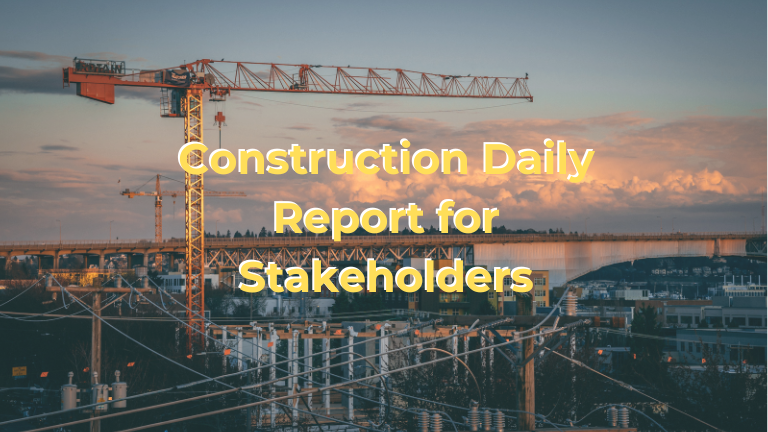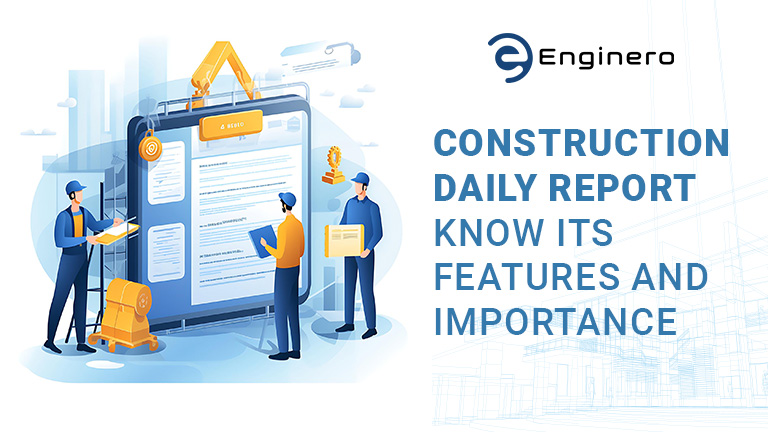In this blog, you will learn about Construction Daily Report and its features
- Understanding the Construction Daily Report
- Importance of Construction Daily Report for Stakeholders
- Challenges in Construction Daily Reports
- Strategies for effective reporting in Construction Daily Reports
- Key Features of Streamlining Construction Daily Reports
Construction daily reports are essential documents that provide a detailed account of the day’s activities, progress, and incidents on a construction project.
Creating construction reports and daily reports is a critical responsibility in the construction industry as they serve as a communication tool between construction teams, project managers, and stakeholders to keep everyone informed about ongoing work.
Consistent and comprehensive reporting is essential to track and evaluate the progress of construction projects. During the project, the site manager is typically responsible for creating and submitting regular construction daily reports.
Understanding the Construction Daily Report
A construction daily report is a log that records all the activities that take place on a construction site throughout the workday.
This covers the day’s activities, materials used, any issues encountered during the day, and any changes that were made to the project. For a variety of reasons, a general contractor, construction project manager, or even the project owner may need a construction daily report.
All relevant data about the workplace, such as the weather, work delays, issues encountered, tasks done by employees, and much more, will be stored in the daily report.
Importance of Construction Daily Report for Stakeholders
Construction daily reports serve as a crucial communication tool between the different stakeholders of the project as they involve every individual, from first-level workers to top-level managers.
These reports are extremely vital for all the different stakeholders that are involved in a construction project because they promote transparency, informed decision-making, and overall project success.

Project managers use the daily reports to get an overall image of the project by tracking the backlogs, issues, deficiencies, and performance. With this, they can easily estimate the completion time of each stage and adjust the budget allocation.
Site supervisors rely on construction daily reports to document and communicate daily tasks on their construction site. Information about personnel, equipment usage, weather, safety precautions, and any unforeseen difficulties encountered are all included in this report.
Supervisors can effectively manage resources, swiftly resolve safety concerns, and maintain an efficient and well-organized construction site.
Project owners and clients significantly benefit from the daily reports as they receive transparent insights about their projects from the project management team.
By getting frequent updates on accomplishments, delays, and daily activities, project owners can manage expectations and make informed decisions. Coordination and trust among project stakeholders are fostered by this transparency.
Construction daily reports are essential for maintaining security since they record valuable information. In terms of legality, these reports guarantee the integrity of building projects by providing crucial proof for risk management, compliance, and dispute resolution.
Challenges in Construction Daily Reports
As the name suggests, a construction daily report should be prepared and circulated on the same workday. Crafting these reports presents several challenges for each individual involved. One of the major hurdles is that it is time-consuming.
The project members must allocate a part of their time to these reports. On the job site, construction professionals frequently juggle a lot of tasks, so making time for thorough and accurate reporting can be difficult.
Another hurdle comes from human errors during manual reporting. The reliability of the reporting process can be hindered if pen and paper or conventional spreadsheets are used, as this raises the possibility of errors.
Furthermore, delays in daily report submission may obstruct prompt decision-making, affecting project schedules and overall progress.
The diversity of construction projects also presents a challenge because each of the projects has distinct characteristics that make it difficult to create a unified reporting template that works in every circumstance.
Construction sites are dynamic venues in which instances change quickly. It might be difficult to capture accurate details during the ambiguity, which could cause inconsistency in the information that is reported.
To overcome this obstacle, strong validation procedures that improve data entry accuracy must be put in effect.
Addressing Challenges in Daily Reporting
In the field of construction, addressing challenges related to daily reporting is a critical aspect of ensuring the accuracy and efficiency of project data. This involves delving into specific strategies and solutions, with a particular emphasis on the role of construction software in minimizing these obstacles.
To create the best construction daily log, here are some strategies to consider when going through the process.
Strategies for effective reporting in Construction Daily Reports
Integrate Construction Technology
Human error is quite a common obstacle, which cannot be predicted and avoided. But, with the help of construction technology integration with report-making, these errors can be mitigated.
Encouraging individuals to capture the issues or requirements.
Avoiding paper usage, which is a time-consuming aspect of report preparation, becomes essential for efficiency.
Standardize the Reports
Report-making styles differ for individual persons. The introduction of construction software simplifies this process by providing readily available templates specific to each trade.
This not only facilitates easy report creation but also ensures uniformity across diverse reporting styles, contributing to a central and consistent approach to project documentation.
Maintaining Transparency and Accountability in Construction Daily Report
Construction daily reports must have transparency in the information furnished. It should not create ambiguity among trades.
The simplicity of the daily reports plays a key role in preventing misconceptions and delays and promoting effective communication across several aspects of the construction process.
This clarity is especially needed since it facilitates the seamless transmission of information and supports decision-making.
Similarly, accountability evolves into a vital element in the successful execution of construction projects. Failure in the report submission may lead to backlogs and critical complications.
Construction collaboration software plays a significant role in this basis by alerting project members through custom notifications upon task submission with an expected date.
Enginero provides a solution to get rid of the strenuous paperwork, offering a streamlined approach to daily reporting with a variety of report types.
Let us delve into its key features that make report-making a seamless process:
Key Features of Streamlining Construction Daily Reports
Automated Report Scheduling with Project Members
The schedule Export feature of Enginero helps you automate your reports related to issues, RFIs, clashes, and BOQ (bill of quantities).
All you have to do is initialize the report type, choose the type of report, specify the time, days, or months for the reporting schedule, and select the members with whom the report is to be shared.
Once scheduled, the respective members will receive an email with the report attached.
To have seamless construction management, reports need to be automated with the project members.
Swift Reporting: Time-Saving Templates in Construction Daily Report
Enginero’s report templates provide a standardized and effective way to streamline the reporting process. These pre-designed frameworks provide a framework for creating consistent reports across various aspects such as issues, RFIs, clashes, and BOQ (bill of quantities).
These templates provide a customized framework for producing reports that are consistent across a range of topics, including clashes, issues, RFIs, and Bill of Quantities (BOQ). The process is simple, just select the desired columns to be displayed in your report, group the data, and your report is ready to get published.
Conclusion:
Construction Daily Reports serve as important documentation for the project’s progression, promoting transparency and informed decision-making.
The hurdles associated with manual report preparation, such as human error and time-consuming processes, are significantly mitigated through the adoption of construction software.
Utilizing advanced technologies not only enhances accuracy but also streamlines the reporting process, ultimately optimizing efficiency and contributing to successful project outcomes.



Leave a Reply